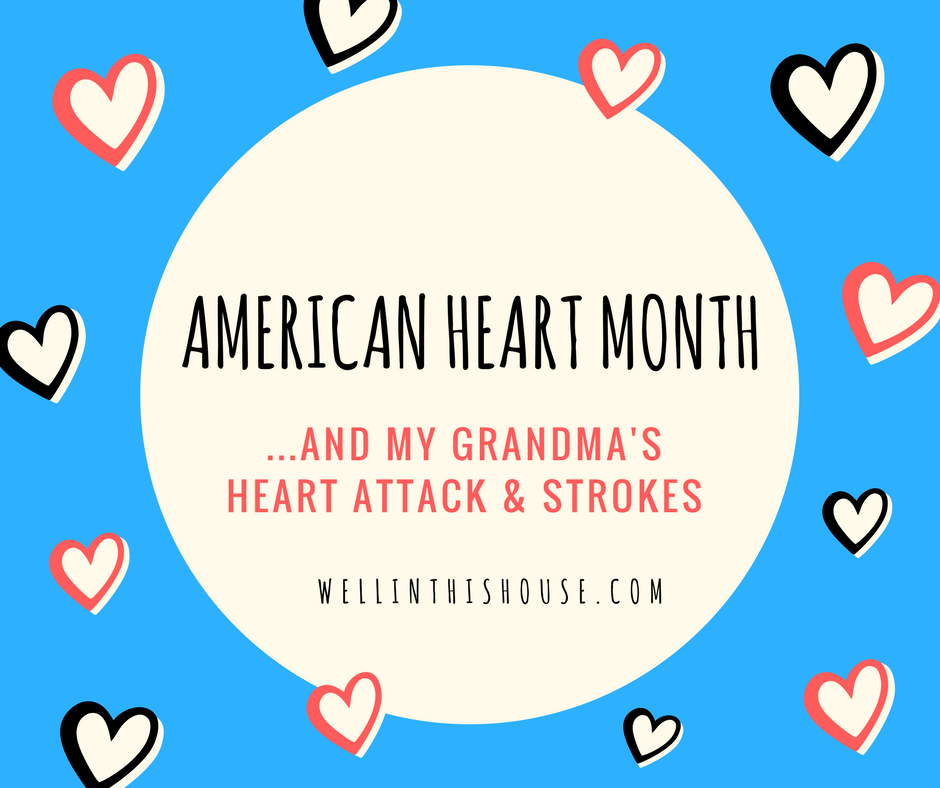Everything changed on Friday, February 17, 2017. Tom and I were sleeping in, only to be awakened by the doorbell, where one of my brothers stood to offer to drive me to the hospital to see Grandma because I hadn’t been answering my text messages.

One of my uncles had made his daily morning phone call, then called my mom because Grandma was slurring her words and sounded as if she was drunk…at 8:00 am. She hasn’t been a heavy drinker in years. Mom went down to check on her and talked her into going to urgent care. Urgent care declared she needed an ambulance ride to the hospital. Thankfully, the urgent/emergent care facility is able to stabilize patients as best they can for transport to its associated hospital.
There is a much longer version of this story, but the short version is that Grandma’s difficulty breathing caused her oxygen levels to drop dangerously low. This resulted in her having a heart attack and multiple minor strokes. She could have died several times, but she didn’t. Her heart didn’t even stop, which I know because I was standing with my mom as she witnessed Grandma giving “verbal” consent (head shakes or head nods) for her DNR orders and other wishes. Basically, if medical intervention could fix her, she wanted it. But she didn’t want to be resuscitated if her heart stopped, and she didn’t want to be on life support. She also didn’t want a feeding tube.
As it turned out, she was very lucky. Though the strokes were multiple, and on the left side of her brain, her right side is not paralyzed – just weaker. The biggest effect was on her speech. She has expressive aphasia, where her mind comprehends everything she hears and she knows what she wants to say, but the words just won’t come out. It is intensely frustrating for her, but she’s been getting more of her speech back every day, and she can walk with a walker even though it’s exhausting. She has already been medically cleared and has been transferred to an acute rehab facility, where they will continue with speech therapy, OT, PT, and everything else she needs to retrain her brain. They are optimistic about her recovery. It may not be complete, but she should regain most of her previous abilities. (And now she can’t refuse to use her walker, and PT should help with her bad hip, which she refuses to get surgery for.)
Symptoms of Heart Attack in Women
It never hurts to remind people that women’s heart attacks often present more subtly than men’s heart attacks. The American Heart Association lists these primary heart attack symptoms for women:
- Uncomfortable pressure, squeezing, fullness, or pain in the center of your chest. It lasts more than a few minutes, or goes away and comes back.
- Pain or discomfort in one or both arms, the back, neck, jaw, or stomach.
- Shortness of breath, with or without chest discomfort.
- Other signs such as breaking out in a cold sweat, nausea, or lightheadedness.
- As with men, women’s most common heart attack symptom is chest pain or discomfort. But women are somewhat more likely than men to experience some of the other common symptoms, particularly shortness of breath, nausea/vomiting and back or jaw pain.
My grandma’s primary symptom was her shortness of breath, likely because that is what the doctors think caused it. But if you note that you’re experiencing the aforementioned symptoms, call 911. Minutes count.
Symptoms of Stroke in Women
I think stroke symptoms are less well known than heart attack symptoms, so I went to Go Red for Women to find a list of women’s stroke symptoms:
- Sudden numbness or weakness of the face, arm or leg, especially on one side of the body
- Sudden confusion, trouble speaking or understanding
- Sudden trouble seeing or blurred vision in one or both eyes
- Sudden trouble walking, dizziness, loss of balance or coordination
- Sudden severe headache with no known cause
In my grandma’s case, she didn’t complain about anything but her shortness of breath prior to being taken to emergent care, so we don’t know how many of these symptoms she actually experienced. But it was her kids who identified and/or witnessed her confusion, trouble speaking, trouble walking, and loss of coordination. There are more external cues to a stroke than a heart attack for most women, so add in the sudden confusion bit, and it’s far more likely that a loved one or other observer will see you’re having a stroke than for you to figure it out yourself.





